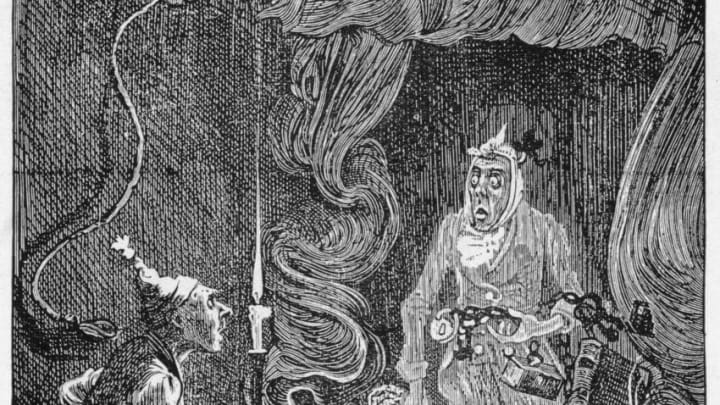Ebenezer Scrooge and Captain Picard are similar in some ways.
How does A Christmas Carol connect to Star Trek? While Charles Dickens’ classic Yuletide tale, first published in 1843, isn’t science fiction, it’s an imaginative story that addressed issues of its day in an attempt to inspire change—something Star Trek knows about! Incensed at how his industrial society turned a callous shoulder to those in poverty, Dickens dreamed up a story to stir greater compassion and charity.
Fans of Star Trek: The Next Generation may remember a more direct connection. The fourth season episode “Devil’s Due” starts with Data in the holodeck playing Ebenezer Scrooge—the “squeezing, wrenching, grasping, scraping, clutching, covetous, old sinner” in Dickens’ book who ultimately learns “how to keep Christmas well.”
Captain Picard, Data’s “director,” compliments the android on his progress as an actor. But in real life, Sir Patrick Stewart himself is Star Trek’s most direct connection to A Christmas Carol.
Stewart played Scrooge in a widely praised one-man show starting in 1991. He also played Scrooge in a 1999 TV movie. That year, Stewart told the Christian Science Monitor he thought A Christmas Carol contains messages the world needs to hear about learning to love, being unafraid, and taking “a responsibility for others in our society who are not perhaps as fortunate as we are.”
But apart from the fact, Sir Patrick has played them both, do Ebenezer Scrooge and Captain Picard have anything in common?
3 Things Jean-Luc Picard and Ebenezer Scroog have in common
1. Both Scrooge and Captain Picard are uncles.
In the first chapter of A Christmas Carol, Scrooge’s nephew Fred invites his uncle to celebrate Christmas with the family—an invitation that prompts Scrooge’s famous snarl of “Bah, humbug!” But in its last, once he has learned the lessons of the season, he goes to Fred’s home and is warmly welcomed.
Fortunately for Captain Picard’s nephew, René, his uncle is far from the mean old man Fred’s uncle originally was! We can hardly imagine the unreformed Scrooge indulging Fred in a bit of whimsical nonsense as Picard does René by addressing the boy as “uncle” in the episode “Family.” Nor, frankly, can we imagine Scrooge before his transformation weeping for his nephew as Picard weeps for René when he hears of the fire at the Picard home in Star Trek: Generations.
2. Both Scrooge and Captain Picard are initially uncomfortable around children.
Granted, “uncomfortable” is a mild way to describe Scrooge’s early animosity toward children. When a group of young boys come caroling at his counting-house, he scares them away. But when Scrooge awakens, to his amazed relief, on Christmas morning, he gushes with praise for the young boy he sends to purchase the prize turkey: “An intelligent boy! A remarkable boy!”
“Encounter at Farpoint” established Captain Picard’s disapproval of Starfleet’s decision to include families with children aboard the Enterprise. “I don’t feel comfortable with children,” he tells Riker. “But, since a captain needs an image of geniality, you’re to see that’s what I project.” But by the end of TNG’s run, Picard has grown more comfortable around children. He acquits himself quite well with the ship’s science fair winners in “Disaster,” for instance.
3. Both Scrooge and Captain Picard travel through past, present, and future.
Scrooge learns the lessons of Christmas because the Ghosts of Christmas Past, Christmas Present, and Christmas Yet-to-Come show him Yuletides from each of those eras. He remembers he was once capable of love. He sees people in the present who need his love. And he is shown a possible future in which he dies alone and unloved. “I will live in the Past, the Present, and the Future!” Scrooge declares. “The Spirits of all Three shall strive within me.”
In “All Good Things…,” TNG’s series finale, Captain Picard needs to learn to transcend linear thinking in order to solve the mystery of the anomaly threatening human existence. He does so by piecing the puzzle together as he shifts between his past, his present, and a possible future. Q tells him at the episode’s end, “We wanted to see if you had the ability to expand your mind and your horizons. And for one brief moment, you did.”
According to Larry Nemecek’s Star Trek: The Next Generation Companion, Kurt Vonnegut’s Slaughterhouse-Five was Brannon Braga and Ronald D. Moore’s immediate inspiration for this “time-slipping” story (p. 299). But no doubt A Christmas Carol, with which Patrick Stewart was well associated by 1994, also helped shape the episode’s storyline.
Picard even awakens and asks Worf and Troi, “What’s today’s date?”—just as Scrooge awakens and asks that young boy in the street below, “What day is it?” And he goes to his senior officers’ poker game for the first time after his experience, just as Scrooge visits his nephew’s home for Christmas dinner.
And so, may the Great Bird of the Galaxy bless us, everyone!
